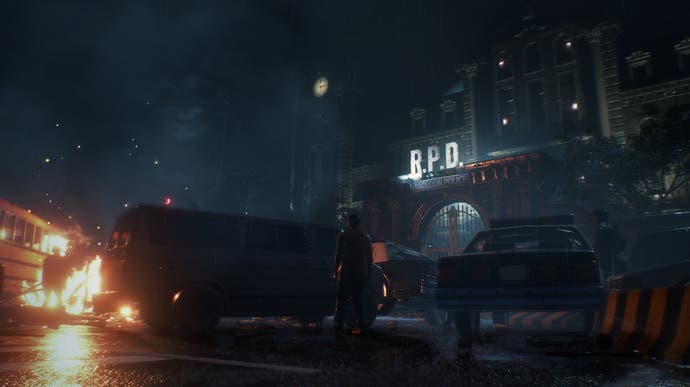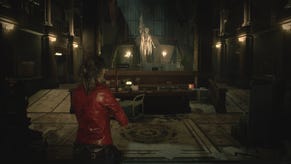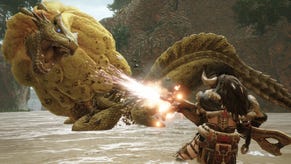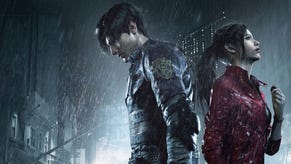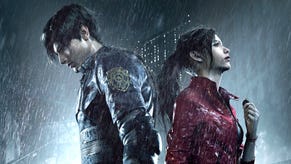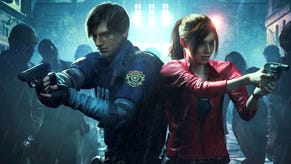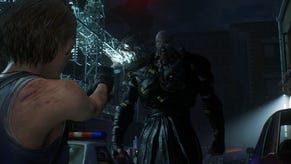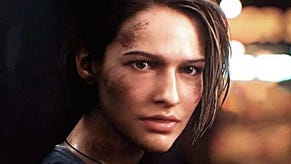Why Resident Evil 2's City of the Dead scares us
Notes from the Necropolis.
If Romero's undead shoppers endure as a sneer at the narcotic lullaby of consumerism, then what more succinct symbol of a city helplessly disarmed is there than a police station commandeered by the dead?
Even better if that police station happens to have been a museum.
Inside, walking corpses gnaw bloody chunks from the long arm of the law and claw away at decades of history.
Order and culture both are consumed, erased, and remade. A polis - or city, and the Greek root for police - transformed to a necropolis.
"Each tomb had its lid loose, pushed to one side, and from within came forth such fierce laments that I was sure inside were tortured souls," writes Dante Alighieri in The Divine Comedy. Unique to Dante's depiction of the living dead, suggests philosopher Eugene Thacker, is their explicit politicisation. The dead here are 'heretics', specifically organised and tortured by a sovereign power. Both citizens of, and threat to, the hellish city of Dis.
It's this metaphorical use of zombies as representing the body politic, or citizenry, that Thacker attributes to Dante, but extends to Romero, Fulci, and the zombie in popular culture. Thacker doesn't mention Resident Evil 2, but I'm sure he'd find a lot to love about Raccoon City's Police Department.
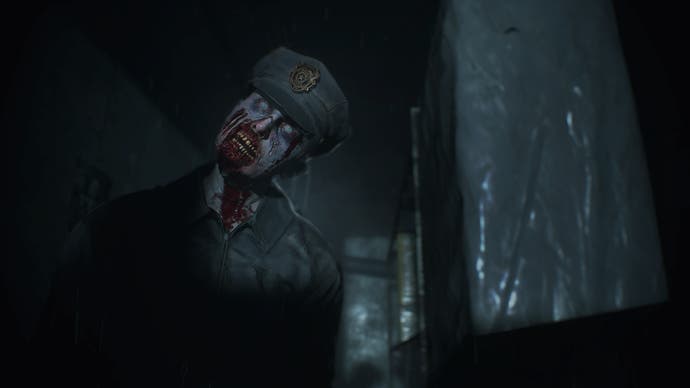
The best cure for a bad case of zombies is, famously, decapitation or a bullet through the brain. In the body politic, just as in the body itself, the head represents reason and rule. It's that same reason that zombification corrupts. With death itself promoted to the highest ranks of the R.P.D, the city's last line of defence - the shield on the badge - is not only nullified, but commandeered. Infected with necrotic rot and used to bludgeon the city into terrified submission.
But, to borrow a question I imagine is quite familiar to the residents of Raccoon City: why did it have to be zombies?
Fittingly, these shambling mockeries of humanity originate from history's most inhumane practises. The zombie myth is, in the words of anthropologist Amy Wilentz, a "new world phenomenon" originating in "old African religious beliefs and the pain of slavery, especially the notoriously merciless and cold blooded slavery of French-run, pre-independence Haiti". A slave who took their own life, went the myth, would be denied entrance to heaven and instead forced into an eternity of undead servitude. Wilentz points out slave drivers themselves may have perpetuated these beliefs, using the "fear of zombification to keep recalcitrant slaves in order". This last point is especially appalling, suggesting the plantation slaves were not just robbed of their bodies, but even the freedom to take their own lives as a final act of defiance.
Modern pop culture's walking cadaver is not only a corruption of flesh, then, but of its own folklore; a corpse of corpse, dug up, hosed clean of history, and sent off to torment the living.
Writing for the Atlantic, Mike Mariani highlights this "bitter irony between the Haitian zombie and its American counterpart". The zombie, once a symbol of "the real-life horrors of dehumanisation" is repurposed as a license to "fantasise about human beings whose every decision is exalted". The apocalypse is, after all, a tremendous ego boost for those lucky enough to survive it, who suddenly become a lot more important in the grand scheme of things.
So the popularity of the modern zombie story may be down to a subconscious wish to re-assert dominance over our environment; to thumb the reset button on a bureaucratic, glitch-ridden postmodernity, and to flex our hunter gatherer muscles tracking canned peaches in the ashes of the aisles we once stocked for minimum wage. We can apply this to most any post-apocalypse though. What's interesting about the zombie is the specific threat they pose to this return to an animalistic relationship with our environment. Or at least, one where we keep our place at the top of the food chain.
"[Zombies] are uncanny in themselves because they once were human but have undergone a terrible rebirth and become mechanisms with a single function - to survive for survival's sake..."
Further reading of Thomas Ligotti's The Conspiracy Against the Human Race - the masterful horror writer's bitterly sardonic spiel against life itself - reveals survival "for survival's sake" is a futility he attributes to humanity at large. Ligotti suggests the revulsion we feel towards zombies emanates from the illusions dispelled about ourselves when we're forced to confront their mindless consumption and reproduction. Namely, the fiction there's something inherently noble or meaningful about our own survival.
I'm not quite the pessimist Ligotti is (although 2019 is young), but I do think his ideas distil a secondary meaning from the term "Survival Horror". That is, the innate horror of the survival instinct itself - what Schopenhauer called "the will to life". As undead roaches, killer fungi, and psyker felines show us, nature is capable of some truly nightmarish feats in the pursuit of sustenance and propagation. If the only thing that separates us from zombies is restraint over our nature, then what does that say about nature itself? If zombies didn't go straight for the neck and instead corralled humans into pens, fattened them up on chemical feed, forced them to lactate, then eventually slaughtered them for food, would we consider them any less horrific? One species dominates another, and that's nature. Something comes to replace us, and that's horror.
The zombie is, in this sense, nothing more unnatural than an apex predator. But crucially for their inherent uncanniness, lacking the vitality we'd usually associate with such a creature. Not rigid canines but rotting teeth, not taut muscle but sloughing flesh. Theirs is a horror born from contradiction, the classic That Which Should Not Be. A binary, as Thacker describesthem. Not just between living and dead, but between "the one and the many, the singular and the plural".
They're a uniquely American, capitalist nightmare in this sense. An all-consuming collectivist horde, converting their victims in a flurry of red. All the while remaining completely immune to advertising, body shaming, social anxieties, patriotism, or anything else that could normally be relied on to keep such an unpredictable mass tranquil. The zombie stands (lurches, crawls) apart from the vampire (who is also capable of creating more vampires) and the vengeful ghost (ditto) not only by sheer numbers, but by their ability to use our own symbols of progress against us. A single zombie in a corn field isn't much of a threat. In a crowded city, it is havoc incarnate.
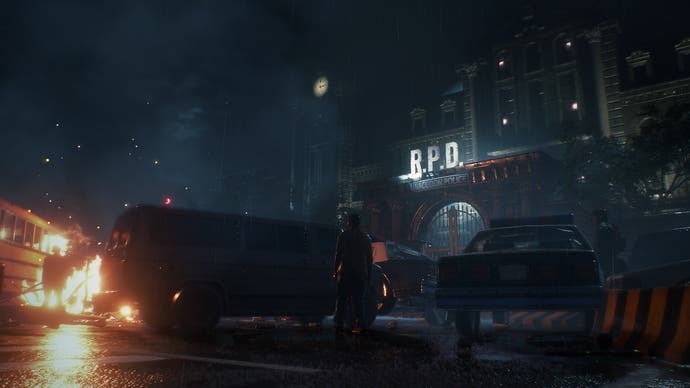
It's here we return to Resident Evil. To Raccoon City, the necropolis. The organised debris of urban sprawl - dwellings, commercial zones, military bases - are, to Thacker, "porous to the miasmatic logic of the living dead". The zombie reshapes the isolationist bastion of urban space - where each spider and rat is an aberration, where foliage and soil only exist by design - into a hostile puppet show, a concrete wilderness draped in the skin of the familiar.
Worse are the puppets themselves. There's a heartbreaking line in the Resident Evil 2 demo where Marvin Branagh warns Leon not to make his "mistake". If Leon sees a zombie - "uniform or not" - he's not to hesitate before pulling the trigger. The line tells us everything we need to know about Branagh's loyalty to his profession and colleagues. It also gestures at the terrible, pacifying effects of the zombie's cruel mimicry. A sort of necrotic toxoplasmosis. The ability to weaponise emotional bonds.
This puppet show necessitates a terrible realisation: if we 'save' Raccoon City by putting a bullet in the head of every single zombie we find there, what are we actually saving? Not its inhabitants, long victim to the outbreak. Not its memories, or customs, or history. Not even its businesses or bureaucracy. Just the husks of buildings and decentralised infrastructure, stock rooms and collateral, all loosely gathered together under the term 'city'. We can depopulate the Necropolis of the dead, just as we can blow the brains out the back of a walker's skull. We can even glue the skull back together, if we're especially attached. But that's it.
In their co-opting of our populations, loved ones, nature, cities and deepest fears, it seems the apparently brainless zombie instinctively knows something we rarely figure out without a few casualties first, and it's the same jewel of wisdom I'd like to leave you with while we all wait anxiously for Resident Evil 2.
Always go for the head.
